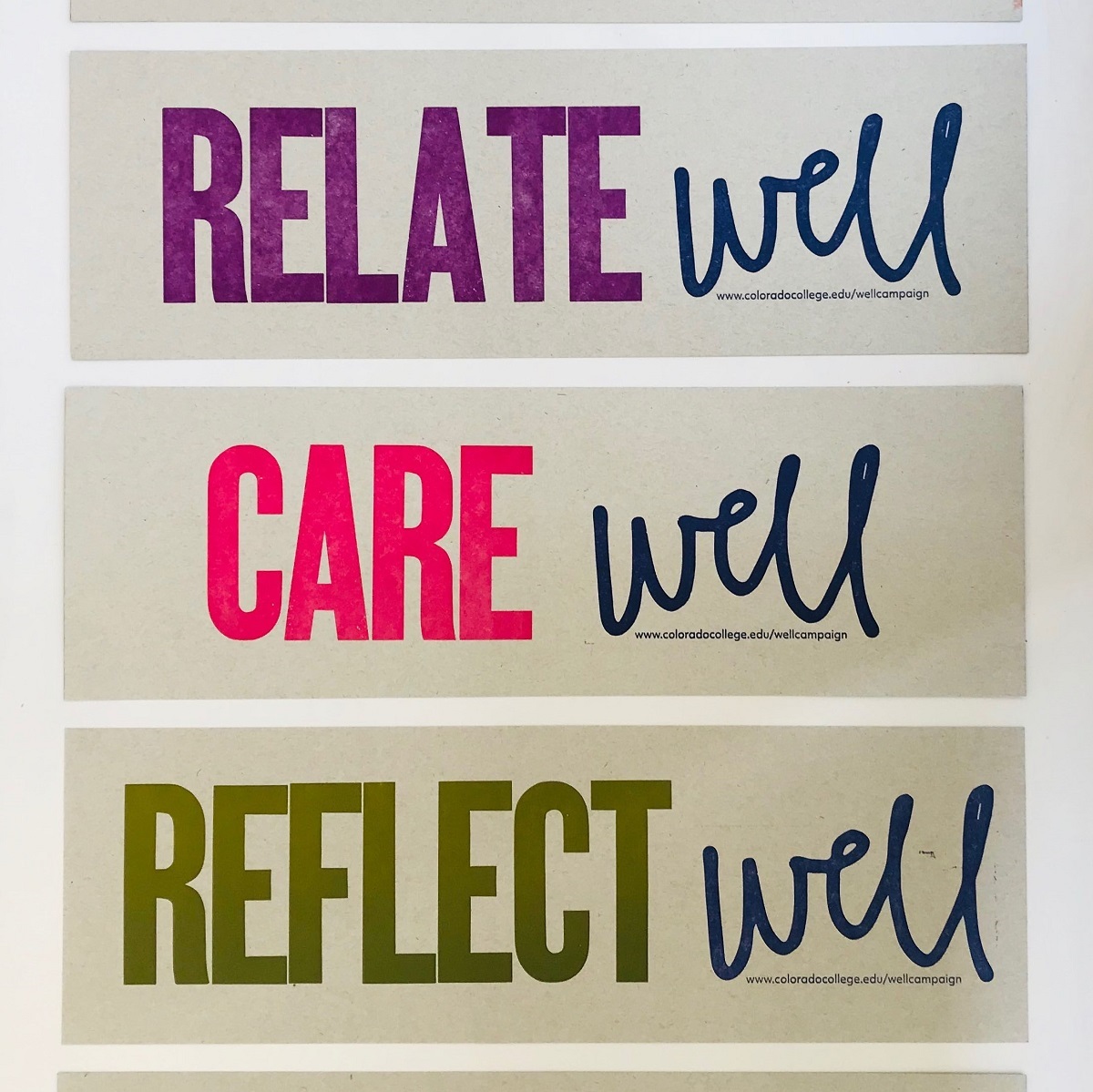By Laurie Laker '12
"CC students and our whole community are highly programmed towards being highly selective and high achieving, and that brings with it a prevalence of anxiety, depression, and other mental health issues. We have to develop ways of talking about this that are empowering, rather than disempowering," says Heather Horton, director of the Colorado College Wellness Resource Center.
With a student body and campus community like CC's, as well as the pace and pressures of the Block Plan, there is an inherent fear of failure - academically, socially, and personally - embedded in the fabric of our space.
"Across the country, colleges are dealing with an increased demand for mental health programming and guidance. But we can't simply hire our way out of this, adding more counselors alone isn't the answer," says Horton.
The Wellness Resource Center at Colorado College is the campus hub for a range of student-focused and -led organizations that takes a holistic approach to wellbeing while focusing on three key high impact areas: mental health promotion and suicide prevention, substance abuse prevention, and gender-based violence response and prevention.
"Over the years, comfort about and around mental health has grown and changed, and students are now far more open in sharing and talking about their challenges," says Horton.
"That being said, the stigma against mental health issues is still very much alive and well in our society," she adds.
To combat that stigma, the WRC sponsors events like September's Movies for Mental Health, an evening of film and workshop discussions around mental health, illness, and awareness. Hosted in collaboration with the CC NAMI (National Alliance on Mental Illness) on Campus chapter and Art With Impact, the event brought around 30 people together in a safe space to highlight and address difficult topics.
"One of our students, Asha Rudrabhatla '20, had worked with Art With Impact previously, and they provided the connection to the college to kickstart the event," explains Horton.
"We screened three films, each around five minutes long, dealing with subjects like sexual violence, depression, and racism, and had a panel discussion that included a student telling her mental health story, counselors from the Student Health Center, myself, and people from both NAMI and AWI," says Horton.
The three films, "Me Too," "Purpose," and "Strange Fruit," were provided by Art With Impact, which works to promote mental wellness by creating a space for young people to learn, connect, and heal through art and media projects. They have a huge store of student and young artists' films to facilitate events and discussions.
Such discussions, across the student body and beyond, are vital to the continued growth and wellbeing of our entire campus community, says Horton.
"We have to talk about these subjects, and present our community with resources for awareness and care. Given the high rates of anxiety and depression that the current generation of students are experiencing, they are perhaps, less resilient with fewer developed coping strategies and confidence in those strategies for dealing with mental health issues," explains Horton.
"We have to try to build and promote a comprehensive mental health strategy for students, and prevent them from living in struggle until a crisis point. They have to do this work, too, to be more proactive about their wellbeing."
The WRC's resources are numerous, designed to empower and engage students with - ultimately - their own wellbeing and the wellbeing of their community.
The college offers six free counseling sessions per year to every student at the Student Health Center, which approximately 35% of CC students utilize each year, Horton says. Other resources include the Well Campaign, Mental Health First Aid training, regular workshops on active bystander intervention, substance use, self-help and resilience skill building, to name a few.
The Well Campaign, launched in 2018, highlights different aspects of wellness and health - with emphasis on the process of striving towards healing and wellbeing. Mental Health First Aid trains community members to effectively and compassionately respond to mental health emergencies, and to offer support to someone in emotional distress. The BADASS Active Bystander Intervention Campaign aims to build the capacity of our community to recognize and respond to behaviors that contribute to violence or discrimination, and/or signal that someone might be in distress or in need of assistance. Resilience skill building teaches students to evaluate their own mental health status, sources of stress, and current management skills so that they may maximize their strengths and build new skills in order to overcome struggles.
Academic pressures are a big part of the mental health landscape on a college campus, and the WRC has been heading up collaboration with faculty members across all departments. Faculty have, for some time now, been adding components on mental health, time and stress management, and mental health resources to their course syllabi, along with statements of support and compassion to students as they begin new classes each block.
"Having faculty on the front lines of this is really helpful for students," explains Horton. "Letting students know that faculty are aware of the issues, communicating expectations, while also serving as guides towards resources and healing, that's important."
College staff, too, are being trained in mental health awareness and care via the Excel at CC programming for professional development. Included in this programming is the Compassionate Community: Unlocking Full Access to the Life of the Mind training series, which incorporates training in mental health first aid, responding to trauma, and effective referrals for students.
"Ultimately, everyone in this community has a duty of care to everyone else in this space," Horton says.
"At the WRC, we're aiming to prime students to talk about mental health in ways that are empowering to them, as well as expose them to failure and vulnerability as a part of life and an opportunity for growth and learning. We want to help students see these things as opportunities to connect with their own strengths, and our resources are a part of that."






